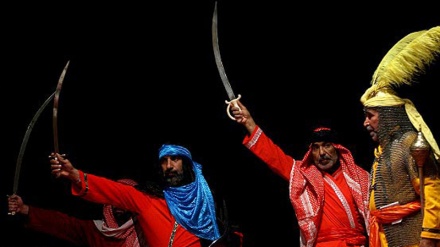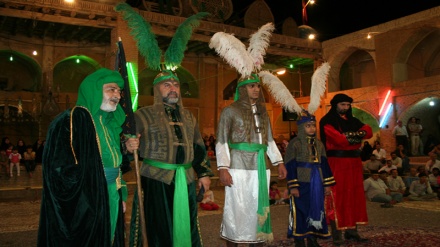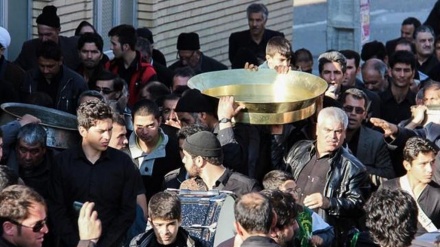Muharram mourning traditions in different lands - 41
Welcome to the 41st and last part of the series titled “Muharram Mourning Traditions in Different Lands” that we started broadcasting as of October 15 on a daily basis, to commemorate the heartrending tragedy of Karbala, and the martyrdom of Imam Husain (AS), the grandson of Prophet Mohammad (SAWA).
In this series, which delves into the mourning traditions associated with the Immortal Epic of Ashura, we have been focusing on the various norms prevalent in different towns and cities of Iran as well as other countries for commemorating the heartrending tragedy of Karbala. Today we will focus on Pakistan.
Pakistan is situated in South Asia, and its capital is Islamabad. It shares borders with Afghanistan, India, Iran and China. The country has a population of about 190 million, of whom 30 percent are Shi’a Muslims, in addition to the majority of Sunnis who also revere the Prophet’s blessed household, the Ahl al-Bayt. It means, even though Pakistani Muslims belong to various Islamic denominations, all of them agree about mourning in the month of Muharram, and mourning ceremonies in this month are performed with special dignity and reverence. Certainly, Pakistani television and radio broadcasts special programs and mourning ceremonies in the month of Muharram, including speeches by religious authorities or “Ulema” and recitation of elegies or “Nowheh Khani”. Pakistani Muslims don’t listen to music, and do not take part in celebrations of any kind, in the first ten days of Muharram, and this is a strict rule which is adhered to in public places, such as hotels, shopping centers, markets, public transport and buses. Also the Pakistani press, both government-run and private, print special articles regarding the History of Islam, significance of mourning ceremonies of Muharram, and the history and life of the Chief of Martyrs, Imam Husain (AS).
From the point of view of Shi’a Muslims in Pakistan, Muharram mourning ceremonies are especially important, and participation in these mourning ceremonies is considered “a must”. They wear black clothes, as a sign of mourning, from the first of Muharram, and mourning ceremonies in Pakistan, similar to India, continue for two months and 8 days, until the 8th of Rabi al-Awwal, the martyrdom anniversary of Imam Hasan Askari (AS), the 11th Infallible Heir of Prophet Mohammad (SAWA). It means that during the months of Muharram and Safar, and the first eight days of the month of Rabi al-Awwal, Pakistan’s Shi’a Muslims do not participate in any wedding ceremonies, or any celebrations or parties of any kind. Mourning ceremonies in Pakistani villages is different to the mourning ceremonies which are held in cities. In villages and small towns, mourning ceremonies generally involve recitation of elegies and lamentations. In major cities, such as Karachi, Islamabad, Lahore, Multan, Hyderabad and others, speeches are made by Ulema or religious authorities to large gatherings, and huge mourning processions walk the streets, beating their chests and heads, flagellating themselves using chains, and reciting elegies and lamentations for the Chief of Martyrs, Imam Husain (AS). The 10th of Muharram, the day of Ashura, is a national holiday in Pakistan and all shops and markets are closed. Both Shi’a and Sunni Muslims, as well as members of Pakistan’s small Christian community, take part in Muharram mourning processions and streets in Pakistan are more crowded than usual in the month of Muharram.
In Pakistan, a special name is given to each of the first ten days of Muharram, and on each of these days, religious authorities who make public speeches, concentrate on one particular aspect of the tragedy of Karbala and the calamity which befell the grandson of the Holy Prophet of Islam, his family and friends and supporters. The mourning ceremonies reach their zenith on the 9th and 10th of Muharram, that is Tasua and Ashura.
We should say that in all major Pakistani cities the government closely oversees the mourning ceremonies in order to prevent terrorist attacks in major cities and places such as Islamabad, Peshawar, Rawalpindi, Gilgit, Lahore, Karachi, Quetta, Hyderabad, Muzaffarabad, Mianwali, Larkana, Jhang, Chakwal, Faisalabad, and Kashmir. One of the main concerns of the Shi’a Muslim community in Pakistan is lack of security and occasional terrorist attacks which each year take their toll on the mourners of the Prophet’s grandson. Despite Pakistani government efforts to prevent such terrorist atrocities against its Shi’a Muslim citizens, sadly, most years, the followers of the Prophet’s Ahl al-Bayt are targeted by various terrorist outfits which are active in the country, and funded by Saudi Arabia, Israel and the US. Another important point is that the Sunni Muslims of Pakistan also revere the Chief of Martyrs Imam Husain (AS), and have special respect for him. This is why they line-up along major streets of towns and cities, and as mourning processions pass through, they provide their Shi’a brethren with water and cool drinks. Also in recent years the leaders of the Sunni Muslim community have tried to provide safety and security for Shi’a Muslim mourners.
As a matter of fact, in recent years, the mourning ceremonies for the Martyrs of Karbala, have turned into a veritable show of unity and friendship between Sunnis and Shi’a Muslims in Pakistan, and this is certainly to be admired.
Another mourning tradition in Pakistan is the making of an empty coffin, usually made of wood or aluminum, and covered with black cloth, as if a body has been placed in it for burial. Throngs of mourners carry this “symbolic coffin of the martyrs of Karbala”.
Another tradition is the carrying by crowds of weeping mourner of a cradle – symbolizing the cradle of the Imam’s six-month old infant son Hazrat Ali Asghar (AS).
Also during the months of Muharram and Safar, various “stations for rest and refreshment”, known as “Sabeel” in Urdu, are set up along major routes and streets throughout Pakistan. And at these “stations” mourners can stop and have some tea, a drink of water, or some milk, and also a special food called “Haleem” is distributed between mourners and members of the general public in Pakistan.
Well dear listeners we have come to the end of our programme, and indeed the end of this Radio series. We hope that you enjoyed it and found it interesting. Wishing you all the best. Hope you have really enjoyed our 41-part special programme “Muharram Mourning Traditions in Different Lands.” Goodbye and God bless you all.
MD/AS/ME


